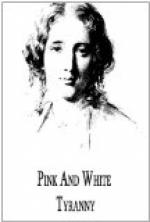“Oh, gracious me!” said Lillie: “I can’t imagine more dire despair than to sit all day tending baby.”
“Well, so you would think; and Charlie has offered to hire competent nurses, and wants her to dress herself up and go into society; and she just won’t do it, and sticks right down by the cradle there, with her children running over her like so many squirrels.”
“Oh! I hope and trust I never shall have children,” said Lillie, fervently, “because, you see, there’s an end of every thing. No more fun, no more frolics, no more admiration or good times; nothing but this frightful baby, that you can’t get rid of.”
Yet, as Lillie spoke, she knew, in her own slippery little heart, that the shadow of this awful cloud of maternity was resting over her; though she laced and danced, and bid defiance to every law of nature, with a blind and ignorant wilfulness, not caring what consequences she might draw down on herself, if only she might escape this.
And was there, then, no soft spot in this woman’s heart anywhere? Generally it is thought that the throb of the child’s heart awakens a heart in the mother, and that the mother is born again with her child. It is so with unperverted nature, as God meant it to be; and you shall hear from the lips of an Irish washer-woman a genuine poetry of maternal feeling, for the little one who comes to make her toil more toilsome, that is wholly withered away out of luxurious circles, where there is every thing to make life easy. Just as the Chinese have contrived fashionable monsters, where human beings are constrained to grow in the shape of flower-pots, so fashionable life contrives at last to grow a woman who hates babies, and will risk her life to be rid of the crowning glory of womanhood.
There was a time in Lillie’s life, when she was sixteen years of age, which was a turning-point with her, and decided that she should be the heartless woman she was. If at that age, and at that time, she had decided to marry the man she really loved, marriage might indeed have proved to her a sacrament. It might have opened to her a door through which she could have passed out from a career of selfish worldliness into that gradual discipline of unselfishness which a true love-marriage brings.
But she did not. The man was poor, and she was beautiful; her beauty would buy wealth and worldly position, and so she cast him off. Yet partly to gratify her own lingering feeling, and partly because she could not wholly renounce what had once been hers, she kept up for years with him just that illusive simulacrum which such women call friendship; which, while constantly denying, constantly takes pains to attract, and drains the heart of all possibility of loving another.
Harry Endicott was a young man of fine capabilities, sensitive, interesting, handsome, full of generous impulses, whom a good woman might easily have led to a full completeness. He was not really Lillie’s cousin, but the cousin of her mother; yet, under the name of cousin, he had constant access and family intimacy.




